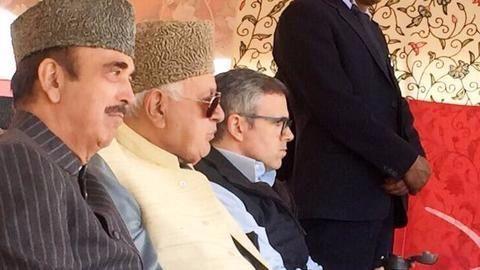
Omar Abdullah: Autonomy has to be taken from Indian Constitution
Omar Abdullah: Autonomy has to be taken from Indian Constitution
31 Oct 2017
National conference (NC) leader Omar Abdullah toughened his party's stance about J&K's special status saying that constitution guarantees autonomy to J&K. So, if talking about that is "anti-national," he "wears the batch proudly."
NC's delegate session, where Omar was talking, re-elected Farooq Abdullah as party president and passed a resolution demanding the state's autonomy.
How has J&K's autonomy demand progressed? Read on!
When did this demand for autonomy arise?
Beginning
In 1947, after India's independence, Hari Singh, the Hindu Maharaja of a pre-dominantly Muslim territory J&K, remained undecided whether to join India or Pakistan.
During this period, Pakistan attacked J&K, prompting Singh to seek India's help.
Indian government promised help only if Singh signed the instrument of accession.
As per the instrument, Kashmir retained autonomy in all matters, except defense, currency and foreign affairs.
What else was promised to J&K?
Promises
After a brief India-Pakistan war, the United Nations brokered a peace deal and Kashmiris were promised a plebiscite in the near future.
Meanwhile, Kashmir had its own president, prime minister, flag and constitution.
Articles giving J&K "special status" were included in the constitution.
Article 370 gave Kashmir autonomy in some matters, whereas Article 35A defined the state's "permanent residents" and granted them special rights.
How did the provisions get modified?
Alterations
People believed Kashmir's first PM Sheikh Abdullah's ultimate aim was Kashmir's independence. He was, however, dismissed and imprisoned in 1953.
After that, through presidential orders, the state's autonomy was reduced.
For example, constitutional amendments were not required for national interest matters, and the SCs and ECs jurisdiction were extended.
In 1965, a resolution that governor was to be nominated by Centre was also passed.
Have political parties made efforts to retain autonomy?
Efforts
In 1975, Sheikh negotiated an accord with the then-PM Indira Gandhi.
Gandhi didn't accept any of Sheikh's demands; however, she promised to consider if some subjects from the concurrent list could be transferred to the state list.
In 2000, Farooq-led NC government passed an autonomy resolution in the assembly reverting to J&K's pre-1953 status. But, this was rejected by Atal Bihari Vajpayee's government.
What is the stand of J&K's stakeholders regarding autonomy?
Stakeholders
Stakeholders have different views about J&K's autonomy.
The ruling PDP wants "self-rule" that includes demilitarization and making Article 356 (President's rule) non-applicable to J&K.
NC wants the pre-1953 autonomy for J&K.
Separatists demand self-determination, that is, people be given the choice to live in India, Pakistan or remain independent. This, they claim, was promised by India during accession.
What is the BJP's stand?
Fact
BJP's stand as highlighted in its election manifesto was the complete inclusion of J&K to India after abrogating Article 370 and Article 35A. This stand is in complete opposition to its ally PDP's. BJP considers the demand for greater autonomy of J&K as "anti-national."
Why is this issue of autonomy in the limelight?
Incidents
The autonomy issue is being debated in light of Congress leader Chidambaram's statements that government should consider giving greater autonomy to J&K.
BJP slammed Chidambaram's statement as "anti-national."
Further, Centre has recently appointed Dineshwar Sharma as interlocutor but failed to define his role distinctly, making people question government's seriousness about the issue.
Meanwhile, SC will hear a case about repealing the controversial Article 35A.

Legal Disclaimer:
MENAFN provides the
information “as is” without warranty of any kind. We do not accept
any responsibility or liability for the accuracy, content, images,
videos, licenses, completeness, legality, or reliability of the information
contained in this article. If you have any complaints or copyright
issues related to this article, kindly contact the provider above.


















Comments
No comment